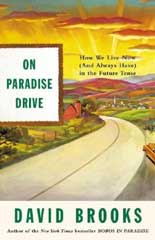
Vol. IV, No. 8, August 2004
- Editor's Corner
- Mothers and Leisure Time
- We've Been in the News
- Beware of Suppliers Promising Plenty
- What's Happening with Children's Edutainment?
- Pal's Sudden Service Drive-Through
- Putt-Putt Celebrates its 50th Anniversary
- Construction Material Price Increases Impact New LBEs
- Families Grab Large Restaurant Market Share
- Kids' Menus Under Major Revision
- Playdate Lawyers
- Get $30 in Books for FREE!
- Cheese Price Increases Impact Profitability
- Busy Dog Days of Summer
- 2005 Educational Seminar Dates Announced
Playdate Lawyers
David Brooks is a political journalist and "comic sociologist." His first book, Bobos in Paradise, is a witty but serious look at the cultural consequences of the Information Age and a penetrating description of how we live now. David describes the world of the "Bourgeois Bohemian" (or "Bobo" to describe today's upper class as a "new meritocracy" or "educated elite"): those who have wed the bourgeois realm of capitalist enterprise to the hippie values of the bohemian counterculture. They are the new movers and shakers of American business -- in banking, law, the media, anything connected to the high-tech industry, even Hollywood. The book gives an important insight into the state of the current generation of people who have climbed high up the tree of success and their new set of values and mores.
 In
his newest book, On
Paradise Road: How We Live Now (and Always Have) in the Future Tense.
David takes a witty look at how being American shapes us, the reason for America's
unification and how America's suburban civilization will shape the world's
future.
In
his newest book, On
Paradise Road: How We Live Now (and Always Have) in the Future Tense.
David takes a witty look at how being American shapes us, the reason for America's
unification and how America's suburban civilization will shape the world's
future.
For those who appreciate a sarcastic sense of humor and a witty use of words (and don't mind too much when some of that sarcasm hits dangerously close to home), this book is another great look at contemporary America.
We couldn't pass up sharing the beginning passage from Chapter Five of On Paradise Road with you. Although filled with sarcasm, it speaks a lot of truths about modern childhood and adulthood, phenomena that many LBEs need to take into consideration in their design and programming.
"I'm trying to persuade my kids to go into the soon-to-be-lucrative field of playdate law. I'm convinced that in a few years, parents are going to be suing each other because their child received insufficiently nutritious afternoon snacks while visiting playmates' homes.
"The way I see it, the role of the playdate lawyer will begin long before the actual playdate. First, the attorney will offer advice on which of, say, a second-grader's classmates would be a good fit for a developmentally appropriate and cognitively enhancing play session - which classmate has sufficient conflict-resolution skills and toy-sharing capacities and the sort of at-home recreation resources necessary to provide an experientially diverse afternoon. Then the attorney will work with the other party to make the playdate overture and explore whether the two children have any free afternoons in common, or whether their soccer league/ballet/SAT prep/recorder lesson/hockey practice/therapist schedules make any playdate impossible.
"Assuming the two children have a free afternoon within the next four-year period, the playdate lawyer will begin negotiating the predate agreements, which are parent-to-parent contracts setting down clear guidelines on all of the normal playdate issues: GameBoy preferences, mean-older-sibling control measures, food-allergy concerns, pet anxieties, and early-pickup contingency plans in case one of the parties decides in the middle that this playdate simply isn't enriching enough.
"Within the larger field of playdate law, I suspect a subspecialty will emerge around the VSIs (video-screen issues). Attorneys in this niche will negotiate separate predate protocols on whether there should be a Nintendo ban or Nickelodeon consumption limits during the playdate, and whether computer games should be prohibited, and if so, whether that includes the ones that teach phonics and typing skills. Some parents will prefer to sign a Document of Joint Understanding forbidding the viewing of all Disney videos while others will deem it acceptable for the children to spend time watching videos from the Little Mermaid/Lion King era but none after Pocahontas."
David's description continues, and then goes on further to depict how Ubermoms, "women who graduated Phi Beta Kappa in economics and engineering, earned MBAs with honors, and rose to the level of senior vice president for corporate strategy at Fortune 500 companies before giving up the job to raise a family," give birth to and raise their children.
Vol. IV, No. 8, August 2004
- Editor's Corner
- Mothers and Leisure Time
- We've Been in the News
- Beware of Suppliers Promising Plenty
- What's Happening with Children's Edutainment?
- Pal's Sudden Service Drive-Through
- Putt-Putt Celebrates its 50th Anniversary
- Construction Material Price Increases Impact New LBEs
- Families Grab Large Restaurant Market Share
- Kids' Menus Under Major Revision
- Playdate Lawyers
- Get $30 in Books for FREE!
- Cheese Price Increases Impact Profitability
- Busy Dog Days of Summer
- 2005 Educational Seminar Dates Announced


